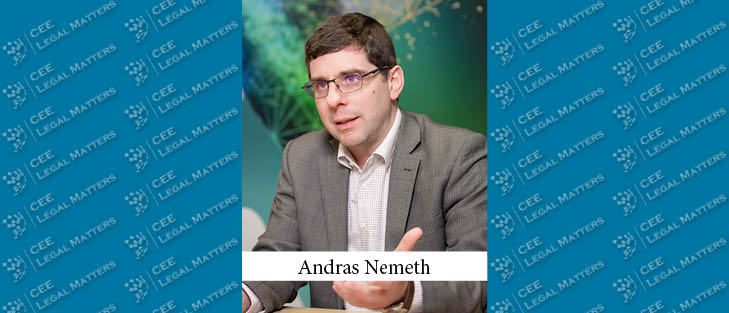Audax Renewables Head of Legal in Hungary Andras Nemeth talks about managing and working as a part of an international team.
CEELM: To start with, what is the structure of your current team across different jurisdictions?
Nemeth: For a bit of a background, Audax Renewables is a Spain-based company operating in seven European countries: Spain, Italy, Portugal, Germany, Poland, the Netherlands, and Hungary for energy supply activities, and also for generation operations in some – for example, France, Poland, Italy and Spain. Our goal is to produce electricity from renewable energy sources. I am the Head of Legal in Hungary and also manage the Group Regulatory Function.
It’s important to note that Audax Renewables’ subsidiaries – and the respective legal and regulatory teams – vary in size and operations. We are present in so-called mature markets like Spain, the Netherlands, and Hungary, where our operations are more established. In some countries, we don’t have local lawyers and only have 10-20 employees, while in others we may have up to six legal counsels, and in some, just one or two. The global regulatory function, which I am also heading in addition to my local role, comprises a member from all seven countries, in some cases local lawyers and in some other cases non-lawyers, too.
CEELM: How often do you meet in person and virtually with members in other jurisdictions?
Nemeth: The group regulatory function that started last December, operates virtually with monthly meetings. This function addresses EU regulatory developments impacting all jurisdictions, facilitating necessary cooperation. We also deal with ESG-related legislation originating from the EU. This centralized approach promotes information sharing, so if one team develops a solution, let’s say in the Netherlands, in other countries we don’t need to duplicate the effort. I have managed to meet with some members at various events and conferences but, unfortunately, we haven’t had a complete physical group meeting yet. That’s still on the agenda.
CEELM: What added value do you see in in-person meetings, that you plan to incorporate in the future?
Nemeth: I’m a firm believer in the value of personal relationships. I have a strong sense that many groups face a common issue: at the local level, there are two competing desires. On one hand, there’s the instinct to maintain autonomy and protect local interests, which may sometimes lead to a critical approach vis-a-vis central initiatives. On the other hand, there’s the obvious necessity to secure additional resources and support from headquarters.
This “leave us alone” and “we know better” mentality can be quite strong. However, I’ve learned that it’s important to show local teams that not everything from headquarters is necessarily negative. Instead, headquarters can be seen as a supportive partner, providing valuable assistance and even resources. Often, local teams view headquarters as an adversary and, in that case, there is a need to shift this perception.
Even though we operate in seven jurisdictions, we are still one group working toward the same success. Meeting in person helps break down barriers, as we talk about not just work, but also personal topics like kids, pets, and hobbies, which makes future interactions smoother. I’d also highlight my 3-year experience with an international law firm that taught me the importance of information sharing and knowledge management. Having experienced that, I am on a personal mission to foster a sense of belonging within our international team. Similar to international law firms, when being employed in a multinational group it should feel natural to pick up the phone and consult a colleague in another country who might have specialist expertise, let it be related to energy wholesale agreements or corporate finance issues. This “make” approach can be more efficient and cost-effective than “buying” this service from an external supplier. This can make a significant difference.
CEELM: What knowledge bank systems do you use and how do you localize relevant data?
Nemeth: We’re not currently using any specialized systems, and unfortunately, at the moment I classify it as a “nice to have” category. Nevertheless, we rely on certain tools like a shared drive and shared inbox, which means that if someone is on vacation, others can still access necessary information. This system is quite useful across subsidiaries, as it eliminates the reliance on individual emails and helps preserve precedents. For instance, if you need to find something from 3-4 years ago and the colleague is no longer with the company, it’s incredibly beneficial.
For our Hungarian operations, we use standard forms and templates for our core business documents, that is customer agreements and certain other instruments like NDAs, settlements, or other corporate (especially HR) documents. These are all accessible to business colleagues through the shared drive for easy knowledge management.
CEELM: What would highlight among the best practices you’ve developed over time in terms of working with an international team?
Nemeth: Whenever I meet team members, I bring them a small gift from Hungary, which they always appreciate. These gestures – however small, can help break down barriers, whether real or perceived, and improve communication.
As a company operating in seven different countries, our legal systems are diverse. We can learn a lot from each other by being open and sharing knowledge. It’s important to remember that you might be the one sharing information one day and requesting it the next, which requires an open mind and resources.
I believe in the importance of regular meetings, whether annually or more frequently, despite our busy schedules. Finding time for these meetings is crucial. Coming together is a major first step that we often overlook. Instead of relying solely on calls, we should embrace an international mindset that considers both time and place.




